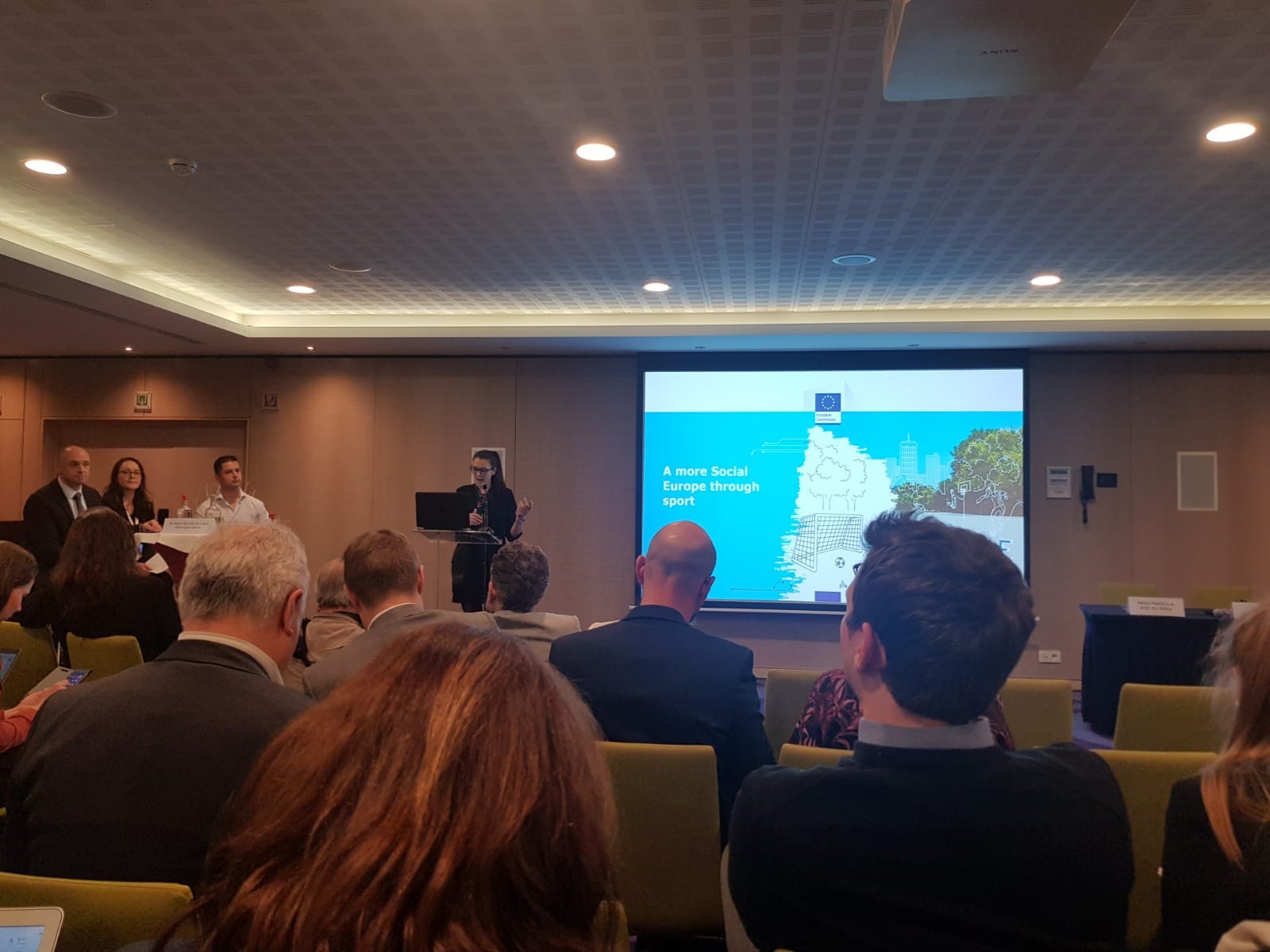#SHAREinitiative : Seminar on sport and regional development

On February 13th in Brussels, the SHARE initiative (SportHub: Alliance for Regional development in Europe) organised a seminar on sport and regional development in sight of the future 2021-2027 Cohesion Policy.
In an attempt to inform and exchange with Member States of the EU, the SHARE initiative, together with the European Commission, invited Council of the EU working parties to learn more about how sport and physical activity (SPA) can, and has, played a role in regional and local socio-economic development. Also present were SHARE initiative members and representatives of DG REGIO and DG EAC.
SHARE was launched in 2018 by the European Commission with the objective to raise awareness around sport’s contribution to regional and local development while also fostering discussions and collaborations around existing best practices- and hopefully sparking future ones too. In other words, as sport and physical activity continue to be wildly overlooked as socio-economic contributors (despite proof) in both thematic objectives and regulations of the cohesion policy, SHARE strives to support and increase SPA’s access to the EU Cohesion policy’s main instrument- European Structural and Investment Funds (ESIF).
The seminar stemmed from consequent research activities that have now been published as policy papers: Mapping Smart Specialisation Strategies for Sport, and The Contribution of Sport to Regional Development through Cohesion Policy 2021-2027.
The latter was presented through 5 thematic policy debates, each steered by a member of the SHARE initiative and with the presence of external guests who all shared concrete examples with the audience. A smarter Europe, Low-carbon Europe, a more Connected Europe, a Europe Closer to Citizens, and a more Social Europe were hence all presented through the medium of sport and physical activity’s possible (policy paper) and existing (invited guests) contributions to said topics. Sport and Citizenship was hence invited to moderate the panel on A More Social Europe through Sport (Kiera Wason-Milne) and to give the floor to Adela Cujko (Permanent representation of the Republic of Croatia to the EU) for policy level insight, and to Tiago Guadalupe (Municipality of Loulé, Portugal) and Blaz Perko (Olympic Committee of Slovenia) for tangible project insight.
A ‘more Social Europe’ is the 4th objective of the Cohesion Policy, which is to deliver on the European Pillar of Social Rights- EPSR. It encompasses 20 key principles, organised into 3 chapters, aiming to deliver new & more effective rights for citizens. The three chapters are organised as follows:
- Employment, the first chapter articulated around:
- Enhancing the effectiveness of labour markets, and access to quality employment through developing infrastructure;
- Modernising labour market institutions and services;
- And also, Promoting a better work/life balance, a healthy and well-adapted working environment and active & healthy ageing;
- The second chapter is Education and Training which prioritises :
- Improving access to inclusive and quality services in education, training and life-long learning through developing infrastructure;
- Improving the quality, effectiveness and labour market relevance of education and training systems;
- Promoting flexible upskilling and reskilling opportunities for all;
- And Promoting equal access to quality and inclusive education and training;
- The third and final chapter is Social Inclusion, which encompasses
- Increasing the socio-economic integration of marginalised communities, migrants and disadvantaged groups;
- Ensuring equal access to health care through developing infrastructure, which includes primary care;
- Enhancing the equal and timely access to quality, sustainable and affordable services;
Bearing these elements in mind, the possible lines of investment to support the sport sector to deliver a more Social Europe, that SHARE advocates for are:
- By Addressing health, enhancing happiness and well-being (notably through healthy ageing and active lifestyles), a self-evident point of entry for sport sector stakeholders since regular sport and physical activity is proven to be paramount to health. Physical inactivity attributes to 10% of annual deaths in the WHO European Region; is further the 4th leading risk factor for global mortality; and is the main cause of non-communicable disease (breast and colon cancer, diabetes, and coronary heart disease).
- The 2nd investment potential is through Social engagement (promotion of social inclusion, fighting poverty and discrimination, and the enhancement of a sense of belonging through sport activities). Sport and physical activity have equally proven to be excellent social mediums, and cost-effective ones too, that can boost the social inclusion of minority and discriminated groups.
- Perhaps less self-evident but just as relevant is to support labour mobility and employment opportunities, which refers to exchanging good practices through mobility of sport staff and volunteers and promoting social businesses in sport. Volunteering is a crucial element of European sport. Volunteering opportunities can promote active citizenship and should be seen as an input of labour, since volunteering has ripple effects into economic activity, in both grassroots and elite sport.
- Finally, SHARE advocates to utilise sport and physical to Improve skills and competences (by using sport to develop broader skills for employment and to promote equal opportunities in sport), and to Improve Governance and Administrative Capacity (to enhance integrity and transparency within the sport sector). Sport is a sector that can create and develop important transferable skills, and foster leadership values – skills that can lead to employability, and leadership that can lead to competitiveness and the capacity for innovation.
The seminar came to end following a policy debate on the role of sport in national policymaking in the context of regional development, with Madeleine Delaperrière (French Ministry of Sport), Luka Zivic (Permanent Representation of the Republic of Slovenia to the EU), Andre de Jeu (Association of Dutch Municipalities on Sports policy) and Ana Odak (Ministry of Regional development and EU Funds) under the moderation of Heidi Pekkola (EOC EU Office).










 MEMBERSHIP
MEMBERSHIP CONTACT
CONTACT FACEBOOK
FACEBOOK